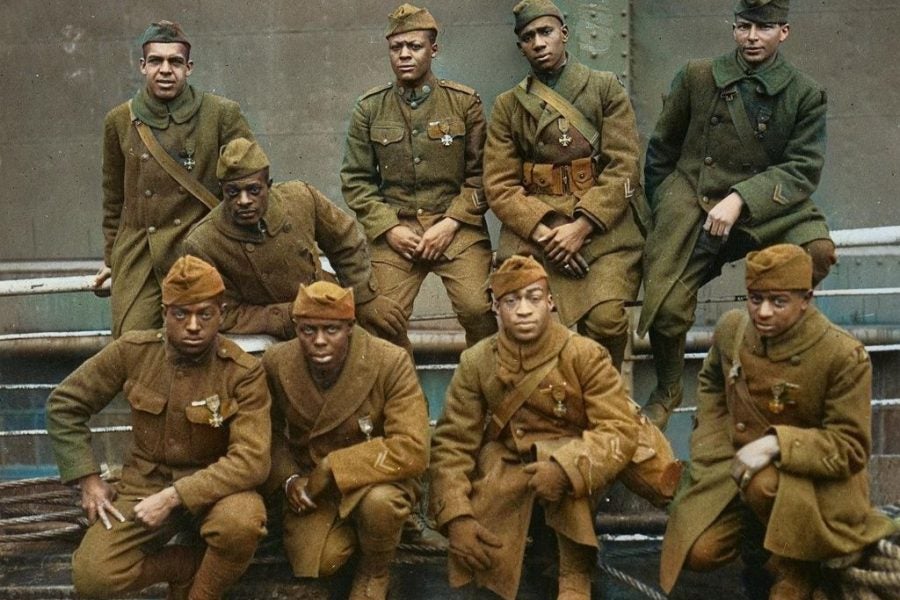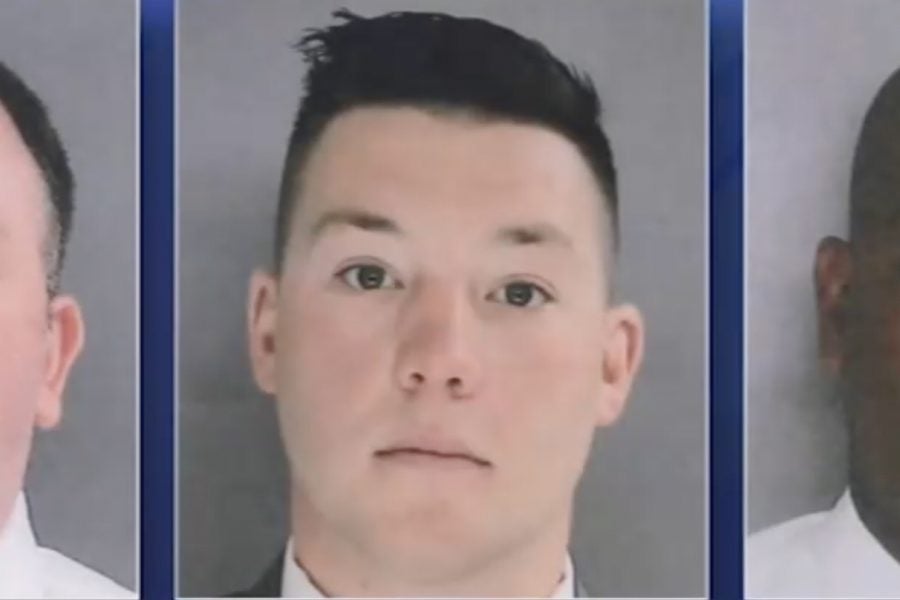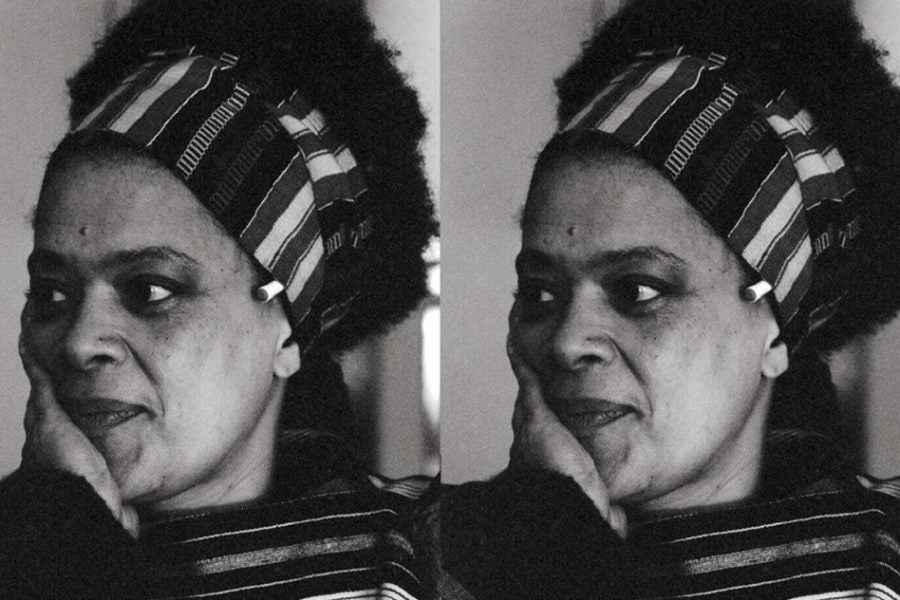
For Black veterans who served in America’s early wars, their return home was plagued by violence and mistreatment — a far cry from the celebratory recognition that was reserved for their white counterparts. These Black men and women risked their lives to protect a country that didn’t respect their full humanity. They fought for the liberation of a country that denied them of their personal liberties.
Returning home was a stark reminder that uniforms didn’t protect them from the dangers and inequality they faced. In fact, wearing their uniforms often put them in more danger. Black veterans were seen as a threat to Jim Crow and racial subordination. As a result, they were threatened, assaulted, and lynched.
Isaac Woodard, a Black army sergeant, was beaten and blinded by a police chief on February 12, 1946, while on his way home from serving in WWII, after arguing with a bus driver. Days earlier, on February 8, 1946, honorably discharged Marine Timothy Hood was arrested after removing a Jim Crow sign in a trolley car in Bessemer, Alabama. Following his arrest, Hood was placed in the back of the police car, where he was shot and killed by the chief of police.
November 11 has been a day to recognize and honor veterans since May 1938, when “Armistice Day” was declared a legal holiday to honor World War I veterans. In June 1954, the holiday was renamed, “Veterans Day,” as the day was then intended to recognize veterans of all wars.
Despite this expansion of who the day honors, from its origins in the 1930s to today, it’s clear that, for many years, this celebration and recognition was reserved for specific types of veterans, as Black veterans faced, and some continue to face, battles extending beyond their service because of the color of their skin.
“One of the things that I recognized was, there wasn’t much real reporting on issues relating to race in the military and the historical legacy of race in the military,” Richard Brookshire, Co-Founder of Black Veterans Project (BVP), told ESSENCE. Brookshire founded BVP four and a half years ago in response to the lack of acknowledgement of the racial disparities. The organization established a working partnership with Yale Law School to gain access to this data on race in the military. “It looked at the last 20 years of racial disparities and disability allocation, which ties to a historical thread of the ways in which Black vets have been locked out of their benefits historically,” said Brookshire.
The military has its own codified justice system, and that was being used as a tool, historically and present-day, to strip Black vets of their benefits when they got out.
“We were able to show, through Yale’s data analysis, that there was a continued pattern of racial discrimination and systemic disparities in disability allocation.” One of the big ones that we were able to glean were, between 2015 and 2020, Black veterans were 29 percent more likely to be denied disability compensation for PTSD,” said Brookshire. “So, when you think about the fact that we’re overrepresented in joblessness numbers, in homelessness numbers, and for a host of social determinants that are a hindrance, I thought it was really valuable data to bring to the table.”
Brookshire spoke on the role that the military’s justice system has played in reinforcing racial disparities. “The military has its own codified justice system, and that was being used as a tool, historically and present-day, to strip Black vets of their benefits when they got out,” he said.
BVP has partnered with two brothers, Conley Monk, Jr. and Garry Monk, both veterans, in pursuit of justice for Black veterans. “Conley was a Vietnam vet. He joined at 19, went off to Vietnam, suffered several traumatic events, and had really bad PTSD,” said Brookshire. “He’d gotten into an argument, where he was called a racial epithet. Because he got into a physical altercation about it with a superior, he was kicked out of the military. He fought for 40 years, trying to get access to his benefits because of it. In 2015, he was able to win a landmark case through Yale. He’s been working with them since the early 90s trying to get access to his benefits. He was able to win a landmark case that provided him and others who had been diagnosed with post-traumatic stress disorder, PTSD, and/or traumatic brain injury, access to their benefits for the first time.”
It was 1970 when Conley, who is now 74 years-old and working as Director of the National Veterans Council, returned home from Vietnam, and found himself unable to access his benefits. “I knew that I should have received an honorable discharge, so I tried to get some legal services. There wasn’t a whole lot available at that time, unless you had money. So, I had a hard time being able to continue to have legal representation. That’s why I continue to fight today to try to help veterans get what they’re rightfully entitled to — get their just dues,” Conley shared.
This wasn’t the first time the Monk family faced obstacles accessing VA benefits. “My father was a World War II veteran. He served in Normandy. Of course there was high discrimination during that time. I didn’t go through anything compared to what my father and the Black vets went through during that time,” said Conley. “When they came home from the military, I’m talking about 1945, they couldn’t get jobs. They were discriminated against. They couldn’t receive any type of benefits. I don’t even think most Black vets knew about disability after coming home from the military.”
His father, Conley Monk, Sr., injured himself in the military, but was never able to access disability benefits. Conley spoke about the generational impact that this level of discrimination had on his family, “If he [Conley’s father] would have been able to obtain the benefits and receive the disability that he was entitled to, his family would’ve been able to go to school and receive a monthly check from the military or government. My mother struggled when my father died. She didn’t know what he was entitled to. Whereas he should have been receiving disability benefits that would’ve been transferred to her when he died.”
Air Force veteran, Garry Monk, is Executive Director of the National Veterans Council. He said that during his time serving, he’d witnessed Black men and women getting discharged for things that, when done by their white counterparts, didn’t result in discharges.
“I’d known of individuals that were about to get out, retire, and some trumped up charges would be put on them and they would lose their whole career,” he said. “So we’re very passionate about what we do. It’s disheartening, it’s a sad conversation, but it’s a reality. We’ve been doing this work since ’82 and with minimum resources. Our thing is to connect — we’re a referral organization. We have politicians, law schools, and other organizations that support us. We don’t just do discharge upgrades and benefit upgrades, we also help veterans with employment, housing, advocacy, just across the board. They come in here, anything that they need we’ll find a way to support them.”







